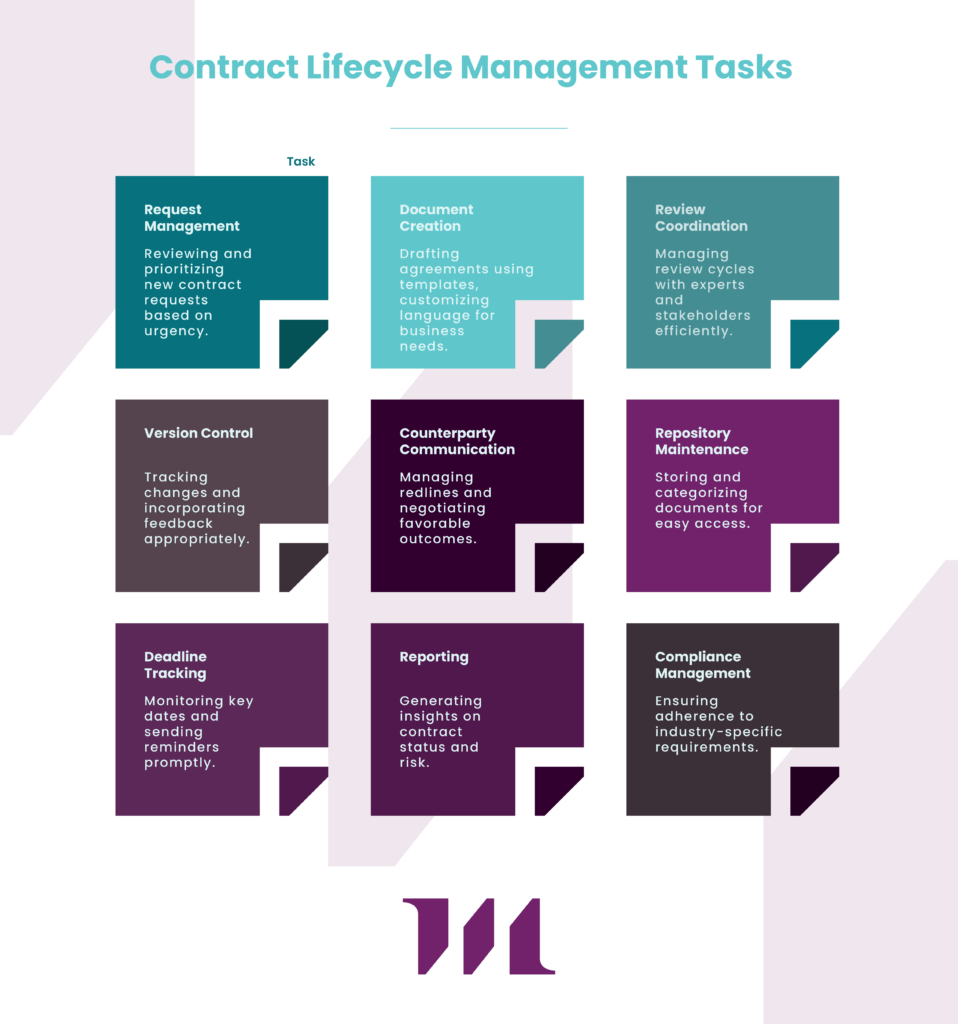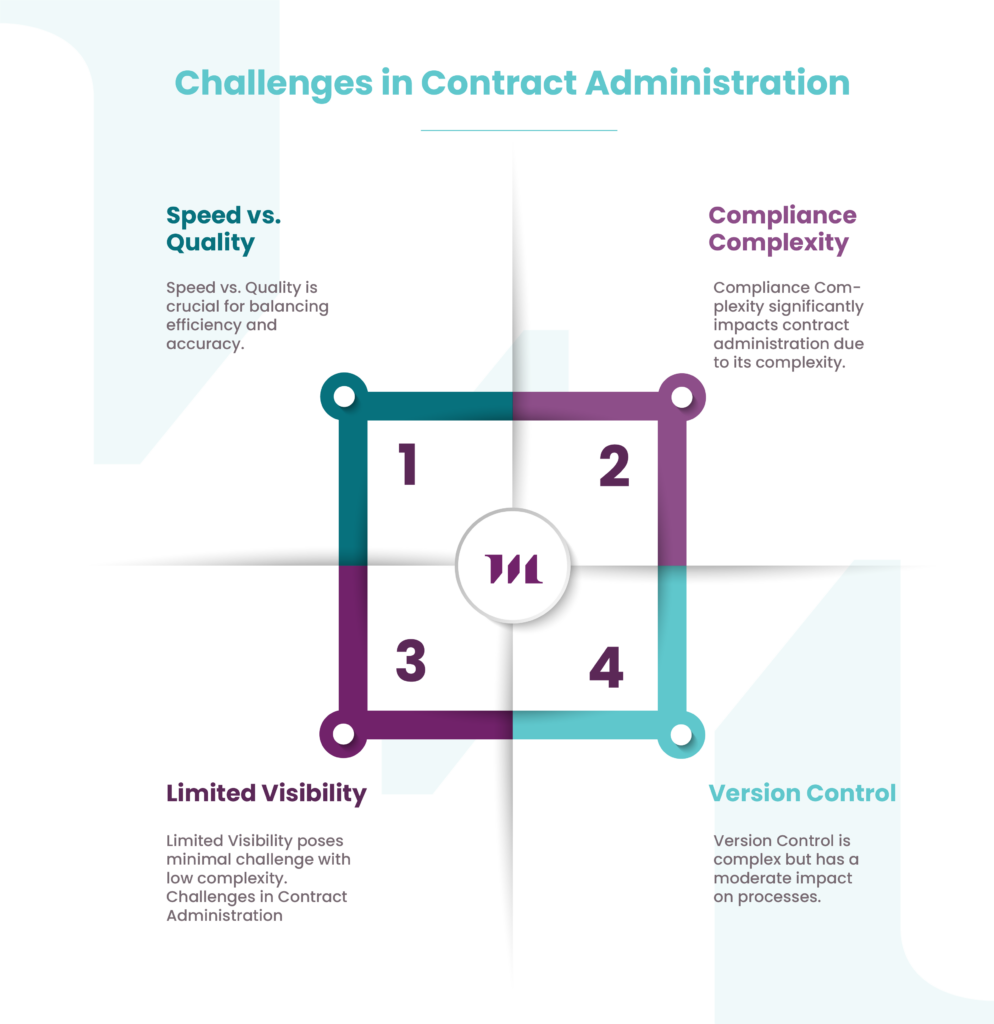Contract Administrator – Roles, Tools, and Tips for CLM Use
Contract administrators are the unsung heroes of business operations. They ensure commercial relationships run smoothly, transforming agreements into action while protecting their organizations from risk. As businesses increasingly rely on partnerships, vendors, and service providers, the importance of effective contract administration has never been greater.
Whether you’re currently managing contracts or leading a team that does, understanding how to maximize efficiency in this critical function can dramatically impact your company’s bottom line. In 2025, contract administrators have more tools at their disposal than ever before, particularly with the rise of Contract Lifecycle Management (CLM) solutions that transform tedious manual tasks into streamlined workflows.
Let’s explore what makes a successful contract administrator, how the role differs from related positions, and how the right technology can elevate your contract processes to new heights.
What Is a Contract Administrator? Defining the Modern Role
A contract administrator is a business professional who handles the end-to-end contract workflow. They oversee the creation, review, negotiation, finalization, and management of agreements, ensuring they meet business objectives and comply with legal standards. Their primary goal is to reduce risk, increase deal velocity, and make sure contracts don’t sit idle waiting for sign-off.
What does a contract administrator do? In essence, they maintain a professional and polished approach to contract management, serving as the central point of contact for all contract-related matters. They coordinate with stakeholders across departments, from legal and procurement to sales and finance, making sure everyone’s requirements are met and that the contract moves smoothly through its lifecycle.
The contract administrator role varies somewhat depending on the industry and organization, but typically involves document preparation, review, negotiation support, approval coordination, and post-signature monitoring. They’re responsible for ensuring that obligations are fulfilled, deadlines are met, and that all parties comply with the terms and conditions outlined in the agreement.
Contract Administrator vs. Contract Manager: Understanding the Key Differences
While often used interchangeably, the roles of contract administrator and contract manager are distinct, particularly in terms of when they engage in the contract lifecycle. The primary difference lies in the timing of their involvement during a contract’s lifecycle.
A contract administrator typically focuses on the pre-execution phase, handling tasks like drafting, coordinating reviews, obtaining approvals, and preparing contracts for signature. They’re concerned with creating clear, well-structured agreements that protect the company’s interests.
A contract manager, by contrast, primarily oversees post-signature activities. They monitor compliance, track milestone completion, manage relationships with counterparties, and handle any issues that arise during the contract’s active period. They’re often responsible for ensuring deliverables are received, payments are made on time, and that renewal or termination decisions are handled appropriately.
While these roles have distinct responsibilities, in smaller organizations, one person might handle both contract administration and management. In larger enterprises, however, these functions are typically separated to ensure specialized expertise at each stage of the contract lifecycle.
The Day-to-Day Responsibilities of a Contract Administrator

The daily work of a contract admin are both varied and detail-oriented. Here’s what their typical responsibilities include:
- Request management: Reviewing new contract requests and prioritizing them based on urgency and complexity
- Document creation: Drafting new agreements using templates and clause libraries, customizing language to fit specific business requirements
- Review coordination: Managing review cycles with subject matter experts, legal teams, and business stakeholders
- Version control: Tracking changes, comparing versions, and ensuring all feedback is incorporated appropriately
- Counterparty communication: Managing the exchange of redlines, clarifying terms, and supporting negotiation of favorable outcomes
- Repository maintenance: Ensuring all documents are properly stored, categorized, and accessible
- Deadline tracking: Monitoring key dates and deadlines, sending reminders to relevant parties when action is needed
- Reporting: Generating insights on contract status, value, and risk exposure for management review
- Compliance management: Ensuring adherence to industry-specific requirements, particularly in regulated sectors
- Process improvement: Developing systems to anticipate needs and prevent bottlenecks before they occur
Contract administrators serve as the central hub for all contract-related activities, keeping agreements moving through the pipeline while maintaining quality and compliance standards.
Essential Contract Administrator Skills
Successful contract administrators combine legal knowledge, business acumen, and process management expertise. They understand how contracts fit into the broader business strategy and can adapt their approach based on the type of agreement and the stakeholders involved.
For anyone asking, “What is a contract administrator?” in today’s business context, the answer goes beyond basic definitions. These professionals are strategic partners who help organizations manage risk, maintain compliance, and capitalize on business opportunities through well-crafted and carefully managed agreements.
Technical Competencies for Effective Contract Administration
A strong contract administrator needs solid technical foundations. First and foremost, they must have a working knowledge of contract law and legal terminology. While they don’t need to be attorneys, they should understand key concepts like indemnification, limitation of liability, and force majeure.
Analytical skills are equally important. Contract administrators must be able to review complex agreements, identify potential risks, and recommend appropriate adjustments. They must be detail-oriented, able to catch inconsistencies or ambiguities before they lead to issues.
Document management expertise is another critical skill. Today’s legal contract administrator must be comfortable with digital tools, able to track versions, manage approval workflows, and maintain secure repositories of executed agreements. Increasingly, familiarity with CLM platforms is becoming an expected competency in the field.
Financial literacy rounds out the technical skills package. Understanding payment terms, pricing structures, and budgetary impacts helps administrators ensure that contracts align with business objectives and financial constraints.
Soft Skills That Set Top Contract Administrators Apart
Beyond technical capabilities, the most effective professionals in this field excel in communication. A contract administrator must be able to explain complex terms in plain language, listen actively to stakeholders’ concerns, and facilitate productive discussions between parties with different priorities.
Negotiation ability is another distinguishing trait. While legal teams often lead major negotiations, contract administrators frequently handle day-to-day discussions about terms, timelines, and deliverables. The best administrators find creative solutions that satisfy all parties while protecting their organization’s interests.
Organizational prowess is perhaps the most fundamental soft skill. Managing multiple agreements simultaneously, tracking deadlines, and coordinating input from diverse stakeholders requires exceptional attention to detail and time management. The best contract administrators develop systems that keep everything on track without constant firefighting.
Adaptability has become increasingly important as business environments change rapidly. Contract processes that worked yesterday may need adjustment today, and successful administrators embrace new tools and approaches rather than clinging to familiar routines.
Challenges Facing Modern Contract Administrators

Despite technological advances, contract administrators still face significant challenges:
- Speed vs. Quality: Balancing pressure to reduce cycle times while maintaining thorough review processes
- Version Control: Keeping track of changes when multiple parties review and revise documents across disconnected channels
- Limited Visibility: Difficulty providing real-time status updates on where contracts stand in the process
- Compliance Complexity: Staying current with varying regulations across industries and jurisdictions
These challenges explain why many organizations are adopting integrated solutions that address these pain points while supporting the evolving needs of contract professionals.
How CLM Solutions Transform the Contract Administrator Role
Contract Lifecycle Management (CLM) platforms are changing the game for contract administrators. These comprehensive solutions address many traditional pain points, allowing administrators to focus on higher-value activities rather than administrative tasks.
For the contract administrator role, CLM platforms provide structure and consistency. They include template libraries with pre-approved language, reducing the need to draft agreements from scratch. Automated workflows guide contracts through appropriate review and approval paths, ensuring nothing falls through the cracks.
CLM solutions also improve collaboration, enabling real-time editing and commenting that eliminates the confusion of email exchanges and multiple document versions. Electronic signature capabilities accelerate execution, while centralized repositories make it easy to find and reference agreements when needed.
Most importantly, CLM platforms provide contract administrators with full visibility across the contract portfolio. They can track status, monitor obligations, and generate reports that highlight risks and opportunities. This visibility transforms administrators from document processors to strategic advisors who help the organization maximize the value of its contractual relationships.
Key Features of Effective CLM Platforms for Contract Administrators
For contract administrators, certain CLM capabilities stand out as particularly valuable. Template and clause libraries with conditional logic allow for quick assembly of accurate agreements tailored to specific situations. This significantly reduces drafting time while maintaining consistency across the contract portfolio.
Automated workflow routing ensures that contracts reach the right reviewers in the proper sequence, with configurable rules based on contract type, value, or other criteria. Automated reminders prevent delays, and approval tracking provides clear evidence of who reviewed and approved each agreement.
The most effective platforms for contract administration also include robust search and reporting features. Administrators can quickly locate specific agreements based on counterparty, contract type, key terms, or expiration dates. They can generate reports on contract value, risk exposure, and upcoming renewals to support business planning.
Malbek’s CLM platform exemplifies these capabilities with its Smart Tagging feature, which automatically identifies and categorizes key clauses for easy reference. Its Playbooks and Guardrails functionality ensures compliance with company policies, while AI-powered templates accelerate contract creation without sacrificing quality.
AI-Driven Contract Administration
Artificial intelligence is revolutionizing how contract administrators work. AI-powered tools can now read and analyze agreements, extracting key terms and flagging potential issues without human intervention. This capability dramatically reduces the time spent on routine review tasks, allowing administrators to focus on strategic matters.
Malbek’s AI Pro uses an ensemble of leading-edge large language models (LLMs) that work together to provide accurate, relevant results. This approach dynamically selects the appropriate LLMs for individual use cases, leveraging industry-leading models from providers like Azure OpenAI and AWS Anthropic.
AI tools help contract administrators with tasks like third-party paper review, automatically comparing incoming agreements against company standards and highlighting discrepancies. They can assess clause favorability, suggesting alternatives when terms don’t align with preferred positions. Some platforms even offer AI-powered chatbots that guide users through contract workflows and answer common questions.
These tools don’t replace human judgment—but they significantly enhance it. A contract administrator supported by AI can handle a larger volume of agreements with greater consistency and lower risk of overlooking important details. As these technologies continue to mature, they’ll further transform the role of a contract manager and administrator, emphasizing strategic thinking over routine processing.
Conclusion
The contract administrator role continues to evolve, becoming more strategic and less transactional as technology handles routine tasks. Today’s administrators need both technical expertise and soft skills to succeed, serving as connectors between business units, legal teams, and external partners.
CLM solutions like Malbek are transforming how contracts are managed—empowering administrators to operate more strategically, minimize risk, and deliver greater business value. AI capabilities further enhance these benefits, allowing contract administrators to focus on value-added activities rather than document processing.
For organizations looking to improve their contract processes, the combination of skilled professionals and powerful technology offers tremendous potential. By implementing best practices for template management, workflow design, and data analysis, contract administrators can deliver faster cycle times, better compliance, and more favorable agreements.
As you evaluate your contract processes, consider how CLM solutions can transform your approach. Malbek’s platform combines intuitive contract authoring, AI-driven analysis, and powerful approval workflows designed specifically to address the challenges contract administrators face daily. Ready to see how Malbek can elevate your contract administration? Request a demo with Casey today to discover how our CLM solution can help your team reduce cycle times, improve compliance, and turn contracts into a strategic advantage.






